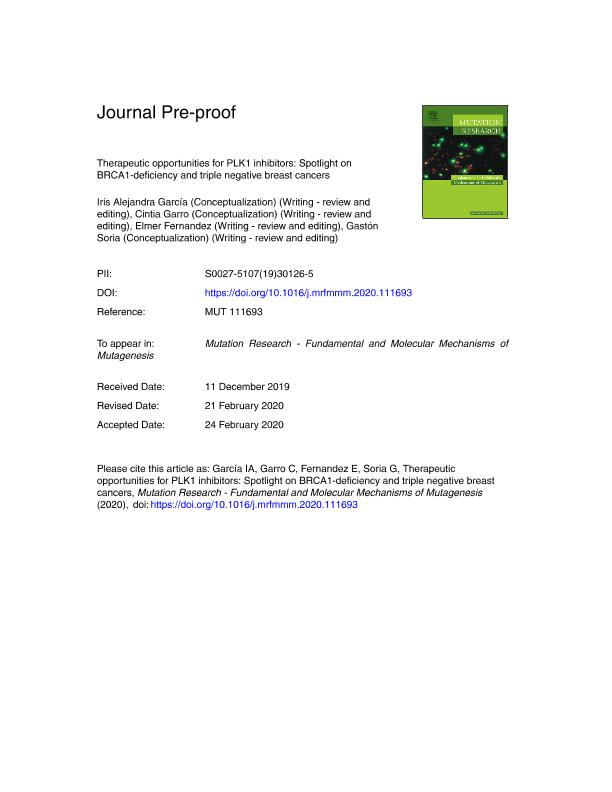Artículo
Therapeutic opportunities for PLK1 inhibitors: Spotlight on BRCA1-deficiency and triple negative breast cancers
Fecha de publicación:
05/2020
Editorial:
Elsevier Science
Revista:
Mutation Research-fundamental And Molecular Mechanisms Of Mutagenesis
ISSN:
0027-5107
Idioma:
Inglés
Tipo de recurso:
Artículo publicado
Clasificación temática:
Resumen
Polo-Like Kinases (PLKs) are central players of mitotic progression in Eukaryotes. Given the intimate relationship between cell cycle progression and cancer development, PLKs in general and PLK1 in particular have been thoroughly studied as biomarkers and potential therapeutic targets in oncology. The oncogenic properties of PLK1 overexpression across different types of human cancers are attributed to its roles in promoting mitotic entry, centrosome maturation, spindle assembly and cytokinesis. While several academic labs and pharmaceutical companies were able to develop potent and selective inhibitors of PLK1 (PLK1i) for preclinical research, such compounds have reached only limited success in clinical trials despite their great pharmacokinetics. Even though this could be attributed to multiple causes, the housekeeping roles of PLK1 in both normal and cancer cells are most likely the main reason for clinical trials failure and withdraw due to toxicities issues. Therefore, great efforts are being invested to position PLK1i in the treatment of specific types of cancers with revised dosages schemes. In this mini review we focus on two potential niches for PLK1i that are supported by recent evidence: triple negative breast cancers (TNBCs) and BRCA1-deficient cancers. On the one hand, we recollect several lines of strong evidence indicating that TNBCs are among the cancers with highest PLK1 expression and sensitivity to PLK1i. These findings are encouraging because of the limited therapeutics options available for TNBC patients, which rely mainly on classic chemotherapy. On the other hand, we discuss recent evidence that unveils synthetic lethality induction by PLK1 inhibition in BRCA1-deficient cancers cells. This previously unforeseen therapeutic link between PLK1 and BRCA1 is promising because it defines novel therapeutic opportunities for PLK1i not only for breast cancer (i.e. TNBCs with BRCA1 deficiencies), but also for other types of cancers with BRCA1-deficiencies, such as pancreatic and prostate cancers.
Palabras clave:
BRCA-DEFICIENCY
,
BRCA1
,
BREAST CANCER
,
PLK1
,
TNBC
Archivos asociados
Licencia
Identificadores
Colecciones
Articulos(CIDIE)
Articulos de CENTRO DE INV. Y DESARROLLO EN INMUNOLOGIA Y ENFERMEDADES INFECCIOSAS
Articulos de CENTRO DE INV. Y DESARROLLO EN INMUNOLOGIA Y ENFERMEDADES INFECCIOSAS
Citación
García, Iris Alejandra; Garro, Cintia Araceli; Fernandez, Elmer Andres; Soria, Gastón; Therapeutic opportunities for PLK1 inhibitors: Spotlight on BRCA1-deficiency and triple negative breast cancers; Elsevier Science; Mutation Research-fundamental And Molecular Mechanisms Of Mutagenesis; 821; 111693; 5-2020; 1-8
Compartir
Altmétricas




